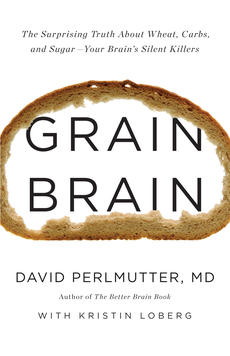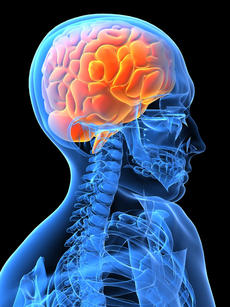 On a recent episode of Dr. Oz, the renowned Dr. David Perlmutter, also known as the “empowering neurologist,” talked about his new controversial book, “Grain Brain,” in which he asserts that almost all carbohydrates, even our supposedly “good” whole-grains and natural carbs that constitute most “healthy diets,” are the cause of the rise in many diseases: dementia, Alzheimer’s, ADHD, anxiety, chronic headaches, depression and much more.
On a recent episode of Dr. Oz, the renowned Dr. David Perlmutter, also known as the “empowering neurologist,” talked about his new controversial book, “Grain Brain,” in which he asserts that almost all carbohydrates, even our supposedly “good” whole-grains and natural carbs that constitute most “healthy diets,” are the cause of the rise in many diseases: dementia, Alzheimer’s, ADHD, anxiety, chronic headaches, depression and much more.
Dr. Perlmutter asserts that:
1) grains and gluten should be avoided in order to prevent the most common diseases, especially those affecting the brain like dementia, memory loss and Alzheimer’s
2) the amount of cholesterol and saturated fat in our diet should be increased because they are essential for brain health
3) that all vegetables that grow underground, such as potatoes, beets, carrots, and most fruits should be eliminated from the diet because they are sugar-loaded carbohydrates
I was very interested in this show for a number of reasons. First of all, I eat a plant-based diet constituted by lots of fruits and veggies that grow above and below ground. Secondly, I agree with Dr. Perlmutter that what we eat can greatly affect and change your health. Third, I strive to be proactive in preventing disease. Last, but not least, Dr. Perlmutter’s assertions, if correct, seem to fly in the face of what many doctors and layman would consider healthy diets. Plus, I was more than curious about how Dr. Oz would react, as a vegetarian. I was on the edge of my seat, taking notes! Would this be a diet that I could or should integrate into eating plant-based?
Dr. Perlmutter states in his blog on HuffPost that the current number of Alzheimer patients, now at 5.4 million, is predicted to double by the year 2030. The number of patients presently with diabetes is at 26 million. He expresses his surprise and frustration that more attention is paid to treating symptoms and that increasingly more money is being earmarked to develop drugs to prevent these diseases when there are meaningful lifestyle and dietary changes that can dramatically reduce one’s risk for diabetes and consequently reduce one’s risk of dementia, since the two have been closely correlated.
 According to AgingCare.com, elderly people who eat diets that are high in sugar are nearly 4 times as likely to develop dementia, as concluded in a recent study by the Mayo clinic. Researchers tracked the eating patterns and cognitive capacity of over 1,200 Americans aged 70 and older for several years. Their findings showed that those that had diets high in carbohydrates were more likely to experience issues with thinking, memory and judgement than those who ate diets with more protein and fat.
According to AgingCare.com, elderly people who eat diets that are high in sugar are nearly 4 times as likely to develop dementia, as concluded in a recent study by the Mayo clinic. Researchers tracked the eating patterns and cognitive capacity of over 1,200 Americans aged 70 and older for several years. Their findings showed that those that had diets high in carbohydrates were more likely to experience issues with thinking, memory and judgement than those who ate diets with more protein and fat.
According to the Alzheimer’s Association, diabetics and people who have consistently high blood sugar have an increased risk for cognitive issues because of:
- – cell-damaging inflammation is triggered by excessive blood sugar levels
- – an inability for brain cells to absorb enough sugar to function properly
- – an increased risk for stroke and heart disease, which can interfere with blood flow to the brain”
 When evaluating the cause of death in the 10 largest Western countries between 1979 and 2010, deaths in America related to brain conditions rose an outstanding 66% in men and 92% in women, as researchers Prof. Colin Pritchard and his colleagues from Great Britain’s Bourbemouth University are cited in the Daily Beast article, “Why We Can and Must Focus on Preventing Alzheimer’s” by Dr. Perlmutter. He also states that “up to 54% of Alzheimer’s cases in the US could have been avoided if proper attention was given to various modifiable lifestyle factors, including diet and physical activity.”
When evaluating the cause of death in the 10 largest Western countries between 1979 and 2010, deaths in America related to brain conditions rose an outstanding 66% in men and 92% in women, as researchers Prof. Colin Pritchard and his colleagues from Great Britain’s Bourbemouth University are cited in the Daily Beast article, “Why We Can and Must Focus on Preventing Alzheimer’s” by Dr. Perlmutter. He also states that “up to 54% of Alzheimer’s cases in the US could have been avoided if proper attention was given to various modifiable lifestyle factors, including diet and physical activity.”
Is Alzheimer’s equivalent to “Type 3 Diabetes,” as some medical professionals call it? And what about gluten? He asserts that sensitivity to gluten has up until now been considered a gastrointestinal disorder but now researchers have clearly demonstrated that this sensitivity can be the culprit in neurological problems as well, even without the typical gastro complaints.
As quoted in an interview with Psychology Today, called “How Our ‘Healthy Diets’ Can Quietly Be Killing Our Brains,” Dr. Perlmutter explains the relationship between bad carbs, good carbs, diabetes and Alzheimer’s:
“Carbohydrate consumption leads to blood sugar elevation obviously in the short term, but also, in the long term as well. Persistently challenging the pancreas to secrete insulin to deal with dietary carbohydrate ultimately leads to insulin resistance, a condition directly associated with increased risk for dementia. What’s worse, insulin resistance is the forerunner of type 2 diabetes, a condition associated with a doubling of Alzheimer’s risk. In a recent report in the Journal of Alzheimer Disease, Mayo Clinic researchers showed that individuals favoring carbohydrates in their diets had a remarkable 89% increased risk for developing dementia as contrasted to those whose diets contained the most fat. Having the highest levels of fat consumption was actually found to be associated with an incredible 44% reduction in risk for developing dementia.
So-called “complex carbs” may actually represent a more significant threat to health than simple sugar in that they may not only raise blood sugar, but keep it elevated for a more prolonged period of time. Foods can be evaluated by their glycemic index which measures not only how high blood sugar will be elevated by the consumption of a particular food, but also takes into account how long it will have this effect. So the higher the glycemic index, the more damaging are the effects of elevated blood sugar. Whole grain bread for example has a dramatically higher glycemic index when compared to pure table sugar.
Ultimately, continued challenges of our bodies with high glycemic index foods leads to elevation of fasting blood sugars. This is of paramount importance as recently published in New England Journal of Medicine. In this report, researchers found that a fasting blood sugar even in the range that most doctors would consider to be normal, levels far below what would qualify for the diagnosis, are powerfully associated with developing dementia.”
 Dr. Perlmutter claims that we all have the power to prevent Alzheimer’s and diabetes and it’s not too late! I was all ears but I became confused as to how Dr. Oz’s vegetarianism seemed to conflict with Dr. Perlmutter’s suggested diet, because in his show, he regularly prescribes many of the foods that Dr. Perlmutter warns against eating. Dr. Perlmutter’s “Anti-Alzheimer’s Trio” is grass-fed beef, avocados and coconut oil. He states that these items are all low in carbs and high in fat, helping to reduce some that “brain-bullying” inflammation, the root cause of so many ailments.
Dr. Perlmutter claims that we all have the power to prevent Alzheimer’s and diabetes and it’s not too late! I was all ears but I became confused as to how Dr. Oz’s vegetarianism seemed to conflict with Dr. Perlmutter’s suggested diet, because in his show, he regularly prescribes many of the foods that Dr. Perlmutter warns against eating. Dr. Perlmutter’s “Anti-Alzheimer’s Trio” is grass-fed beef, avocados and coconut oil. He states that these items are all low in carbs and high in fat, helping to reduce some that “brain-bullying” inflammation, the root cause of so many ailments.
What are vegetarians and plant-based eaters to do with this interesting information? Personally, I rely on grains as an integral part of my diet! According to Dr. Perlmutter, “a vegetarian diet is perfectly consistent with our program. There is absolutely no requirement to eat any animal products whatsoever. What metters most is to be sure your food choice are low in carbohydrate and supply plenty of brain-healthy, heat-healthy fats.” He writes that it’s easy and wonderfully healthy to be vegan, gluten-free and brain-friendly
Ways to Be Vegan and Prevent “Grain-Brain”
- 1) eliminate grains and gluten
- 2) add avocados
- 3) add coconut oil & olive oil
- 4) make sure you’re getting enough Vitamin D, Vitamin B12 and minerals like zinc, copper and magnesium in your diet
 When there so many seemingly conflicting doctors with impeccable reputations quoting studies and research that sound valid and important, who are we to believe?
When there so many seemingly conflicting doctors with impeccable reputations quoting studies and research that sound valid and important, who are we to believe?
Dr. Perlmutter answers these questions on his website:
“Other health advocates and doctors advocate low-fat and vegetarian diets. I am very confused how doctors can be of such opposing views?
By and large the recommendation to avoid meat makes good sense because by and large the meat that is so widely consumed is indeed dangerous for our health. So, the data that these individuals used to make their recommendations is sound. That said, seeking out organically raised, grass-fed beef offers wonderful health advantages. Keep in mind again, that this is not the type of meat consumption that generates the data used by those advocating a low fat or vegetarian type diet.”
“How do you combine the work of T. Colin Campbell (The China Study) and other vegan/vegetarian based researchers with your research and results?
Dr. Campbell’s excellent book is critical of statistics related to health issues in populations eating meat. Understandably, there are problems with eating meat because by and large the meat people are eating these days represents a dangerous food. I agree with absolutely avoiding the type of meat that people consumed in his studies. These are meats from grain-fed animals, which are most commonly genetically modified. In addition, these are cattle who have been treated with antibiotics and who knows what else.”
I’d like to know what our readers think and whether Dr. Perlmutter’s findings resonate with you and will influence your diet. It certainly deserves consideration and thought, despite the fact that it seems somewhat extreme and antithetical to basic vegan diets comprised of many sources of grain, fruit and plant-based carbohydrates. Give up beets??? Definitely food for thought—what’s your take?
Click on These Links for More Sources and More Reading…
The Dr. Oz Episode featuring Dr. Perlmutter
HuffPost Blog by Dr. David Perlmutter
AgingCare.com Article, Too Many Carbohydrates Bad for Seniors Brains
Dr. David Perlmutter’s Website
New England Journal of Medicine
Daily Beast Article, Why We Can and Must Focus on Preventing Alzheimer’s
xox Ellen










I find it difficult to believe that any vegetable, grown underground or above ground causes or contributes to Alzheimer’s disease. That contradicts common sense and logic. Although I agree that white carbs are probably not good, once again, I find it difficult to believe that grains such as quinoa, buckwheat, barley, amaranth, etc. cause Alzheimer’s. I’m going to go back and watch the show to see Dr. Oz’s response. I find the extensive research of other doctors such as Drs. Campbell and Esselstyn to be more credible. Additionally, Dr. Barnard gave quite different views on the Dr. Oz Show.
https://www.veganamericanprincess.com/recap-of-dr-neal-barnard-on-the-dr-oz-show-and-3-recipes-to-prevent-alzheimers/
I agree! It’s very hard to digest! Especially the part that says that complex carbs may be worse because they keep the level of insulin higher for longer. Why can’t doctors read the data and come to a consensus? These are diseases that are preventable!!
i am curios…did Dr. Oz say anything to contradict this belief or did he just let the Dr. share his information?
Hi Dina,
It was interesting how Dr. Oz reacted. I was waiting eagerly to see what he would say to Dr. Perlmutter and to the audience. He said that this goes against much of the advice that he he gives on the show. He didn’t agree or disagree but he listened and seemed to want to understand how Dr. Perlmutter came to his conclusions. He did want to know if someone could be a vegetarian and be on Dr. Perlmutter’s diet. The answer to that was, yes you can. I ‘m going to find the link to the show and add it to my post.
Doesn’t this sound like the ‘caveman diet’? only eating food that is available without agriculture?
Yes, I guess so.
I am sticking with my vegan diet and watching saturated fat levels. I sadly, have seen alot of Alzheimer’s in family and elderly neighbor’s, however when I look at what their diets consisted of it was meat, more meat, loaded carbs, high fat, high sugar. I personally had a bout with genetic pre-disposed high cholesterol even on a vegetarian diet (cheese did it). In July, I switched to vegan have lost 12lbs 2″ and look & feel 10 yrs younger. This lady is staying vegan!!
It’s really commendable that you made that connection of “you are what you eat.” It’s really so simple but so many people just don’t get it. So great that you are feeling great and staying vegan! Thanks for the insightful comment!
I was listening to Neil Barnard while thumbing through Grain Brain. One guy says no meat, no oils, the other guy says some oils and organic meat. The average human being does not have access to organic meat on a regular basis. The root veggies that Perlmutter says to avoid are loaded with phytonutrients. Meh.
Great point!!!!
Some things that are the same about both ways of eating are no processed foods, more whole foods, and a drastic reduction in calories as compared with on a SAD. I think the reduction in calories is the key. I’d like to see a study comparing perfect adherence to Perlmutter’s diet to vegan like Dr. Furhman advocates. Interesting stuff.
Dear Sandy,
That would be a great study to see the comparison between the Perlmutter diet and the Fuhrman Diet. If Dr. Perlmutter concedes that his diet can be achieved through a plant-based diet, I would also love to see a study done that way, as well!
Hi – Dr Oz is not a vegetarian… his wife is 🙂
Thanks for the input!
I am so happy to read your post – how awesome that you are open to Dr. P’s findings, and the info he shares. There are so many of us who have been Vegan or Vegetarian, juicing, etc., and haven’t quite felt that “Glow” that we were expecting. Dr. P’s advice does seem to “Fly in the face” of everything we’ve been told; especially anyone who has done the 80-10-10 diet! I saw Dr. P. speak to a large group of Doctors at a Medical Conference. The evidence he presented, the MRI’s of “Before” and “After” gluten/ gluten-dairy free, videos of patients with cognitive and or movement disorders “before” and “after” were so compelling. I personally decided to follow his advice on Jan 27th, 2014 and now, after 2+ months, I would never go back to my former way of eating. I follow his advice to the letter, and the result have been wonderful for me and for my family. You couldn’t pay me to eat a whole wheat organic muffin, or a have glass of raw, organic milk. 🙂
I’m so glad that you commented and told us your story! It means the world to us! So many people are searching for answers to their health issues through food–that’s an encouraging movement!! I’m glad you’re feeling better. I’m sure Vegan American Princess will continue to explore the findings of various studies and doctors’ recommendations and relate it to our whole, plant-based nutrition philosophy. Thanks again for reading and writing!
I just read the Grain Brain book. Unlike every other DIETS out there this one is specifically an anti inflammatory. If your not allergic to some of the foods he has omitted you will know it if you re-incorporate it into your diet and have no reaction to it. I am a vegan and, yes, there is a lot I am eating that I will need to find substitutes for. But the reason I went vegan was to get healthier. So this is just another step to healthy living. It’s worth a try seeing as my mom died of alzheimers and I have Hashimotos disease. I’ll try it. There’s nothing to lose.
Hi! Your journey to a healthier lifestyle should be applauded. I guess experimenting with how your body reacts to certain foods is a good approach. Let us know how this works out for you. xoxo
I’m amazed, I have to admit. Rarely do I encounter a blog that’s both educative and engaging,
and without a doubt, you have hit the nail on the head. The problem is an issue that not enough folks are speaking
intelligently about. Now i’m very happy I came across this in my hunt for something regarding this.